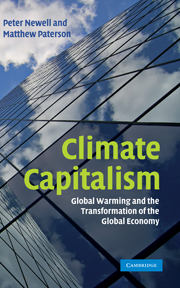Book contents
- Frontmatter
- Contents
- Preface
- Acknowledgements
- List of abbreviations
- 1 Introducing climate capitalism
- 2 Histories of climate, histories of capitalism
- 3 Climate for business: from threat to opportunity
- 4 Mobilising the power of investors
- 5 Searching for flexibility, creating a market
- 6 Caps, trades and profits
- 7 Buying our way out of trouble
- 8 The limits of climate capitalism
- 9 Governing the carbon economy
- 10 What futures for climate capitalism?
- Conclusions
- Glossary
- Index
- References
2 - Histories of climate, histories of capitalism
Published online by Cambridge University Press: 05 June 2012
- Frontmatter
- Contents
- Preface
- Acknowledgements
- List of abbreviations
- 1 Introducing climate capitalism
- 2 Histories of climate, histories of capitalism
- 3 Climate for business: from threat to opportunity
- 4 Mobilising the power of investors
- 5 Searching for flexibility, creating a market
- 6 Caps, trades and profits
- 7 Buying our way out of trouble
- 8 The limits of climate capitalism
- 9 Governing the carbon economy
- 10 What futures for climate capitalism?
- Conclusions
- Glossary
- Index
- References
Summary
Sometimes, in order to look forward, we have to start by looking backwards. What determines how we can respond to climate change is whether we can transform the economy by decarbonising it. Given this, examining how the global economy has evolved in the past may hold the key to understanding how we might transform it in the future. How does the global economy operate? How has it developed over the last 30–40 years? How do these developments shape the way we respond to climate change?
This chapter traces the intertwined history of modern capitalism and climate change. By this we mean the emergence of climate change both as a fact (the trends in emissions, changes in climate) and as an issue (its scientific and policy development and how people have mobilised around it), along with the key shifts in the global economy going on at the same time. This history shows that by the time responses to climate change became well established, notably in the Kyoto Protocol of 1997, the sorts of strategies being developed had been determined by the dominance of financial actors, free-market ideologies, global inequalities, and rise of network and partnership forms of organisation.
CARBONIFEROUS CAPITALISM AND THE ORIGINS OF CLIMATE CHANGE
Other writers have told modern history through the life of a particular commodity whether it be sugar, coffee or, more immediately relevant for our purposes, coal and oil.
- Type
- Chapter
- Information
- Climate CapitalismGlobal Warming and the Transformation of the Global Economy, pp. 11 - 35Publisher: Cambridge University PressPrint publication year: 2010



